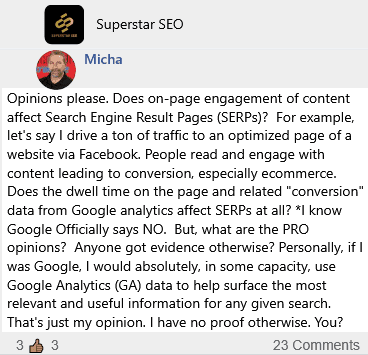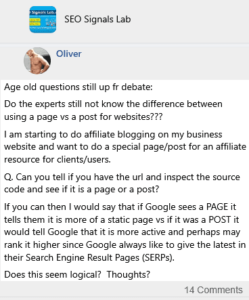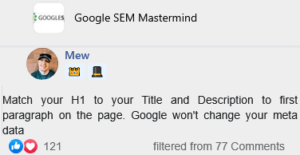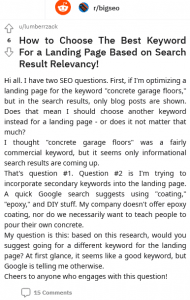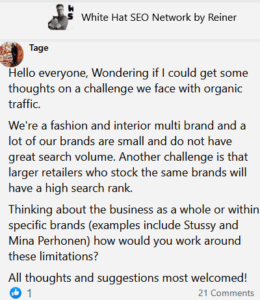Michael Zittel
Opinions please. Does on-page engagement of content affect Search Engine Result Pages (SERPs)? For example, let's say I drive a ton of traffic to an optimized page of a website via Facebook. People read and engage with content leading to conversion, especially ecommerce. Does the dwell time on the page and related "conversion" data from Google analytics affect SERPs at all? *I know Google Officially says NO. But, what are the PRO opinions? Anyone got evidence otherwise? Personally, if I was Google, I would absolutely, in some capacity, use Google Analytics (GA) data to help surface the most relevant and useful information for any given search. That's just my opinion. I have no proof otherwise. You?
📰👈
3 👍🏽3 23 💬🗨
You have social traffic and if you are successful to engage your audience its mean you have good content.
On page mater when traffic came from search engine first Google give you ranking based on your on page score, let say you have high on page score than your Competitor you will get more traffic after that traffic if people stay on your site that will be dwell time and it will give you more ranking in search engine.
Your social media traffic haven't any effect on ranking. Google analytics is just for the measurement tool to analyze your audience reached on your page or site.
Thanks for sharing
Hendra Permana Suryana
For 9 years I have been done Search Engine Optimization (SEO) for lead generation website and it convert much conversions. I'm focus on how to get a qualified visitors and not for traffic or Search Engine Result Page (SERP). Even though I still have a good SERP position (Always getting in Google first page), but I am not really care with it. This is just my personal opinion.
Thanks for sharing
Edward Baker
On-Page Engagement impacts the SERP result of any page it links to internally or externally but not necessarily the SERP of the page linking / the page's score itself. Hope that makes sense? It's a unknown % of pass-through benefit. How do I know? I defer to the Google patents. Call me a guru because I read what others won't and therefore I get results others can't because they won't do the reading themselves and test it to be true. Don't trust my opinion, read the patents for yourself and decide. **Screenshot attached to an important snippet of info. You tell me. 👊
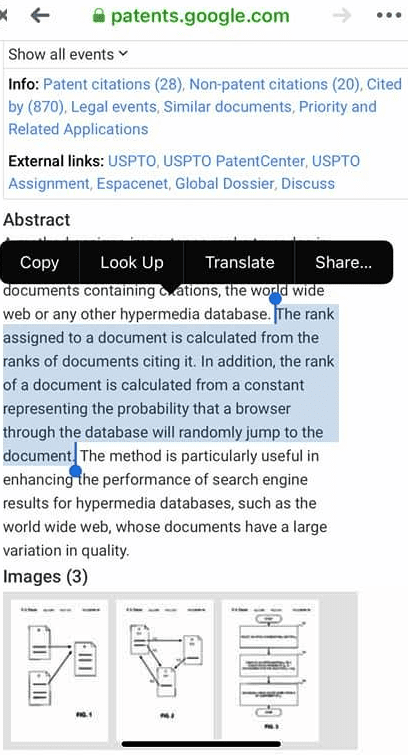
💟👍🏽4
Thanks for your thoughts and the image. That's interesting. The first bit makes sense…quality of backlinks.. the second half is a bit ambiguous, which is probably intentional by Google. I believe you are interpreting the secondary portion as "on-page engagement". Did I understand you correctly? If yes, I would imagine Google determines "on-page" engagement from Chrome and Analytics. How else could they know what a sites "on-page" engagement is?
Edward Baker
Yes, understood & agreed. Hard to determine what constitutes "on-page engagement" but we know Chrome tracks, analytics tracks, android os tracks, eye tracking/movement on smart phones & apps, voice/listening, etc. Regular Google search algo is 800+ factors so on-page is a portion of that. Ultimate on page engagement is conversion or a direct link to conversion. That action/conversion would loop back power to the previous page that sent it without a doubt, as it's a link. I know for a fact links are bilteral relation & relevancy, not one direction. iFrames prove this. Meta descriptions populate on Google SERP from blank html pages with embeds, data is pulled through the iframe, so it for sure "loops" back and forth, it's relativity, however you want to look at it or coin it – matters. Hence why I don't link outbound without extreme consideration. Dwell time, social signals, etc, etc all stack that on page power.
Michael Zittel ✍️ » Edward Baker
Great stuff. Really appreciate your time and sharing.
Jeremy Morrison » Edward Baker
Ya but just because Google has a patent does not mean they applied it and they don't always apply them. My take on this is don't worry if it's a ranking factor or not. I assume it is a factor but really one should not concern themselves with it because if you have choice between having engagement or not having it, everybody would obviously have it. My point is either way, you should be optimizing for engagement regardless.
Alex Griffin
I have a suspicion it does but my official answer is no until I verify over years of data across many sites.
Alex Griffin
Thanks. Appreciate your time. See Edward Baker comments above. Pretty much validates some level of GA data + plus other sources influences SERP. How much exactly is in question.
Alex Griffin » Michael Zittel
There are too many factors, one he stated he doesn't know what on-page engagement actually entails is it different IP's is it the length of time, is it just clicks? If it is just clicks you can confirm as fact AdWords effects on SEO campaigns aren't just vital it's necessary which we know not to be true since there are many sites that don't run AdWords that rank for terms in the first week. Then there is the validity of the clicks in question such as country of origin, does that influence the ranking if you're in Colorado and all of your clicks are from Pakistan? One can only speculate without the raw data which Google won't release.
Michael Zittel ✍️ » Alex Griffin
I understand. From all the comments, I am thinking, yes, to some degree, but as you said, officially no. I pleased with all the responses though. Gives me plenty to think about.
📰👈
Mike Friedman 🎩
I have never seen any real evidence of traffic from other sources and what that traffic does on a page impacting search results. I suspect it doesn't, especially from social media.
The reason I say that is, using your example of Facebook, in many cases Google has no idea 'why' people clicked on a link to come to your site. So how should they reward or penalize the page for the engagement or lack of engagement?
Let's say I post a link in a private group telling everyone that it's a link to a nude photo leak of some celebrity. I suspect, I would get a lot of clicks with something like that. But then the actual page is a plumber in some town. The majority of the traffic is going to quickly leave the site once they realize they were duped.
Now should Google look at that user behavior and rank the page lower for plumbing related keywords?
Google associates the keyword query with a search intent.. this is referenced against the statistical ranking database to then provide a 1 to 10 SERP … then they link this to a behavior to the SERP topic or content context to determine if you found what u looking for and if it is a good answer.
If you are spaming any topic for click bait engagement I.e time on page, bounce rate, shares are not going to be there. So hence its a good bullshit indicator.
If you use the context of a white hat SEO world which i operate in and not a spammy world. Then yes 100% without a doubt time on page and pages per session is 1 of the best indicators of how engaged a person is with ur business. Because if you Re highly engaged in their brand through social media you are also highly likely to be engaged on their website. So it all comes down to great information for your user and being an authority on your topic.
Mike Friedman 🎩 » Jared Jeffery
My point is there is no search intent or query with traffic coming from Facebook. So how can they judge the traffic in relation to search queries.
Jared Jeffery » Mike Friedman
Well ur feed is based on topic groups/topics that you have personal interests in. You didn't get a picture of a car show up without following a car page or a relevant page or talking about a car. Fb ads – core setting is based on interest groups, we know that different areas have different demographics which have different interests – so say a corporate persons fb feed is way different to say a mothers feed. Which ultimately hashtags or content niches is what we are following.
I can see where you are coming from in terms of a clear this 1 keyword derived this outcome however u could say this topic presented this way did produce a behavior or action.. there is search intent however it is not presented in terms of a single keyword, the queries are more topic based interests, so topical relevance SEO value would be passed. If you have tracking then u can associate a landing page with content in a fb post. If you have a video that generates lots of views its research based, if it says go buy my product and 1000s buy online it would be sales based. Behavior and human interaction happens because of a reason we don't think about things we have no interest in unless its forced.
Stockbridge Truslow 🎩
I'm going to say no for several reasons.
1) Google has, to my knowledge, never really outright lied about anything. They say things that can often be open to interpretation or sometimes say things in a way that makes it sound like they're saying one thing but they're really saying something else… but never an outright lie. Since they have said, on numerous occasions that analytics data and search are completely isolated from each other and don't affect the rankings, I tend to believe that.
2) If they WERE actually using analytics data to affect the search results – they'd be opening up to a lawsuit that they couldn't possibly hope to win. Their privacy policy clearly states exactly what data is collected, how it's used, and who it is shared with – and nothing in there suggests that it's used in a way to affect search results. So, to do so would be in direct violation of their privacy policy. If they were using it – there would at least be some ambiguous or vague language in there to allow a legal argument that they were within their right to do so. There's not.
Then, of course, there's also the simple fact that way more than half of the web does NOT use Google analytics. So, if the goal is to really surface the best stuff, then using that to help surface it wouldn't be useful. And, of course, you'd have all sorts of antitrust lawsuits to deal with related to that. You wouldn't expose yourself to that risk just to implement something that isn't going to properly do a good job for you. If you're going to take that risk, you're going to do it in some way that it's actually going to benefit you and your service.
I have to disagree. Google slogan was "don't be evil" and they became the evil ones…
Stockbridge Truslow 🎩
Give me one example of an outright lie that Google or someone speaking on behalf of Google has told.
Jared Jeffery
Um yes… when u find something u like.. is the time u spend on that usually longer then that of if u find something u don't like.. obviously its also relevant to context. Simple answer from my experience is yes. Businesses with users who are more engaged generally rank higher. Why is fb shares such a good indicator.. because u don't share something unless u really are passionate or feel the same view as the post.. if u have a website of people going through 5 pages a session over 1 page average. You are obviously providing more value and info to the user.
Simply put if I talk to you for 15mins a day vs me talking to you 1min a day. 1 shows I probably more interested to talk to the first person etc..
And my final part to the argument. How can a business built completely on social outrank a website with no social media.. I think its clear the users have more say nowdays.
📰👈
These may satisfy you:
» Meme: GMB hits away Traditional SEO
» Some Advice for LinkedIn Content Writing Strategy
